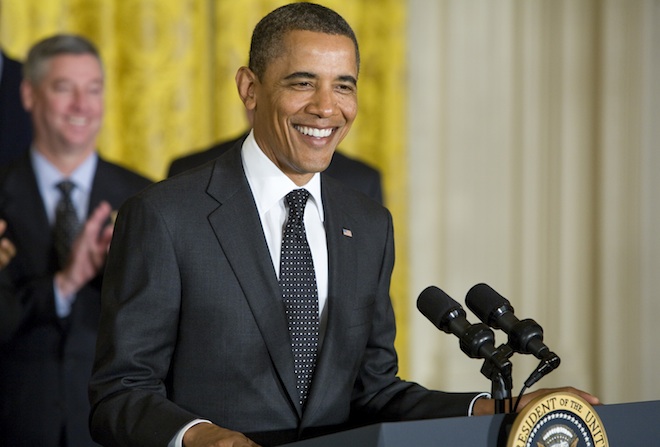Though required by law, White House budgets are largely political documents that tend to become more and more political as reelection time gets closer and closer.
This year’s will technically be no different — but the long-term stakes will be much higher than they usually are and clarifying that fact for voters will be key to President Obama’s appeal in 2012.
In his 10 year budget, set to be released to the public late Monday morning, Obama will advocate a series of tax and spending policies that emphasize near-term economic growth, long term investments in education and research, an enduring social safety net, and over a trillion dollars in new revenue over 10 years taken from wealthy individuals and corporations, based on tax reforms that enshrine the so-called “Buffett rule.”
The document is intended to stand as a moderately progressive alternative to the infamous budget House Republicans adopted overwhelmingly last spring — and are set to readopt with some tweaks later this year. That budget calls for reducing taxes on high-income Americans, and for filling the revenue hole by slashing or phasing out key support programs — most notably Medicare.
Neither the GOP budget nor Obama’s counteroffer will — or are even intended to — become law. But they represent fresh bids in the ongoing fight between the parties over the scope of the safety net, and the question of whether the wealthiest people in the country contribute too much, or not enough, to the public purse.
The policies Obama will advocate are broadly popular; the GOP’s counter proposals are popular among their conservative supporters. But despite the enormous differences and extraordinary implications for public policy, the winner of the November election will claim a mandate to enact their party’s agenda in toto. In other words, the choice facing voters this election year is much starker than it has been in the past — and much more likely to become law in the future.
Budget season therefore has significant implication for legislative politics in the weeks and months ahead. On CBS’ Face the Nation Sunday morning, Senate Minority Leader Mitch McConnell laid it out. “The only budget votes we’ll have in the Senate, which refuses to follow the law and pass a budget of its own, would be a House-passed budget and the President’s budget, so I intend to offer the President’s budget for him so he’ll have a chance to get a vote on it,” McConnell said.
A similar story played out last year. This year, the ending will have to be different. In 2011, nearly every GOP senator voted for the House GOP budget, but Senate Democrats voted unanimously against Obama’s plan. The clumsy tactic, meant to keep the focus on the GOP’s budget and its controversial plan to phase out Medicare, resulted in some embarrassing inside-the-Beltway headlines for Obama. This year, Senate Dems won’t be able to abandon the President en masse, or ignore the broader fight underlying the votes themselves.
House Republicans are already broadcasting their next move. Vulnerable Senate Democrats — and there are several of them — will face a choice themselves in the weeks ahead: Will they align themselves with President Obama and engage in the most critical domestic policy debate of their time? Or do they labor awkwardly to keep their hands clean?










